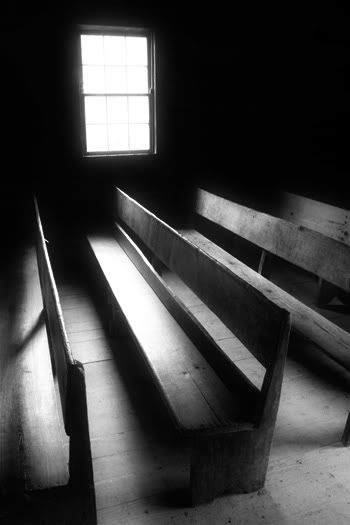
As the he entered the chapel, the young boy remembered that he didn’t have his arms crossed and quickly folded them. The hustle that prevailed over the need to get to church on time seemed to give way to a higher, more sacred quiet. This was not a place to play. The importance of this large room seemed to create an incredible weight that pressed down on him from all directions. There was no place in the world where the boy felt smaller. Without any of the comforts afforded by upholstery, the pews were hard, slick benches that seemed to tower over the boy. Rows of these benches led up to the pulpit, which was made from the same blonde-stained hardwood. From the boy’s perspective the ceiling was a mile high from which hung very large chandeliers that lit the room well. The boy felt guilty when he would think how fun it might be to climb the rock on the walls. The organ pipes hanging from the wall behind the pulpit made a design that seemed to the boy a face starring down at him. He’d close his eyes tightly, trying to avoid that glare. Every time he looked up, it was still there.
This was a solemn place. A place for worship. A place to be quiet. Young boys didn’t know what worship was anymore than they knew why the sky was blue. It just was quiet, a very heavy quiet. Always there was a man – sometimes a woman – who would stand at the microphone and talk about things the boy didn’t understand. These were interminable moments. Trying hard to listen, it mostly didn’t make sense. The boy liked to hear about Jesus – it seemed to comfort him. He’d sometimes hear stories about the man who built his house on the rock and the other guy who built his on the sand. He enjoyed hearing that. He liked to hear about when Jesus helped a man see or walk. He really liked to hear the story about the man who needed help but the only help came from a stranger. But most of the time, the grown-ups would talk about something that just didn’t make sense to his young ears.
The boy did understand the music, though. This young boy liked the singing part. That was the only time when he could raise his voice and push back at that heaviness he always felt here. Some of the hymns weren’t loud enough; that bothered him a little. The hymns didn’t all provide an equal measure of relief. Some brought a greater reprieve while others were simply a break in the talking. Although the Choir might sing sometimes, those times weren’t as fulfilling when the boy could sing with the congregation. That was his time.
It was hard to sit quietly, being still. Sometimes, the boy couldn’t stand it any longer. He would get fidgety – just a little – drawing Dad’s attention. A stern look told the boy to straighten up, stop moving and be quiet. The boy knew that was a warning he must heed. He hated to hear the admonition from his Sunday School teacher to “be reverent”. What does a four-year-old know of reverence? When they taught about reverence, most of what the teachers might say was hardly understandable to his young mind. He only knew quiet and nice. So, he would do his best to be nice and quiet.
The pressure in this solemn place was terribly heavy on the boy. Once, he forgot to pick up his little book when they left after the meeting was over. After realizing what he had done, he asked Mom to go back to get it. Mom was busy and told the boy he could go get it and then they would go home. He had to go in there alone. With no one else in the room, the silence seemed to hang even heavier. The boy didn’t know what fear was. Well, not until he had to go into the chapel alone. Mom and Dad always chose to sit toward the front of the chapel, which made the trip from the back doors a very long, difficult journey into this profoundly quiet, hallowed room. Once he picked the book up, his legs made to run out of the room but he knew he was to never run in the church. He held back, walking as calmly as he knew how. Still keeping his arms folded in front of his chest, he held the book with one hand under his arm. His pace picked up and by the time he was nearing half way back he was almost running – he never ran, though. That would be wrong.
*** *** ***













